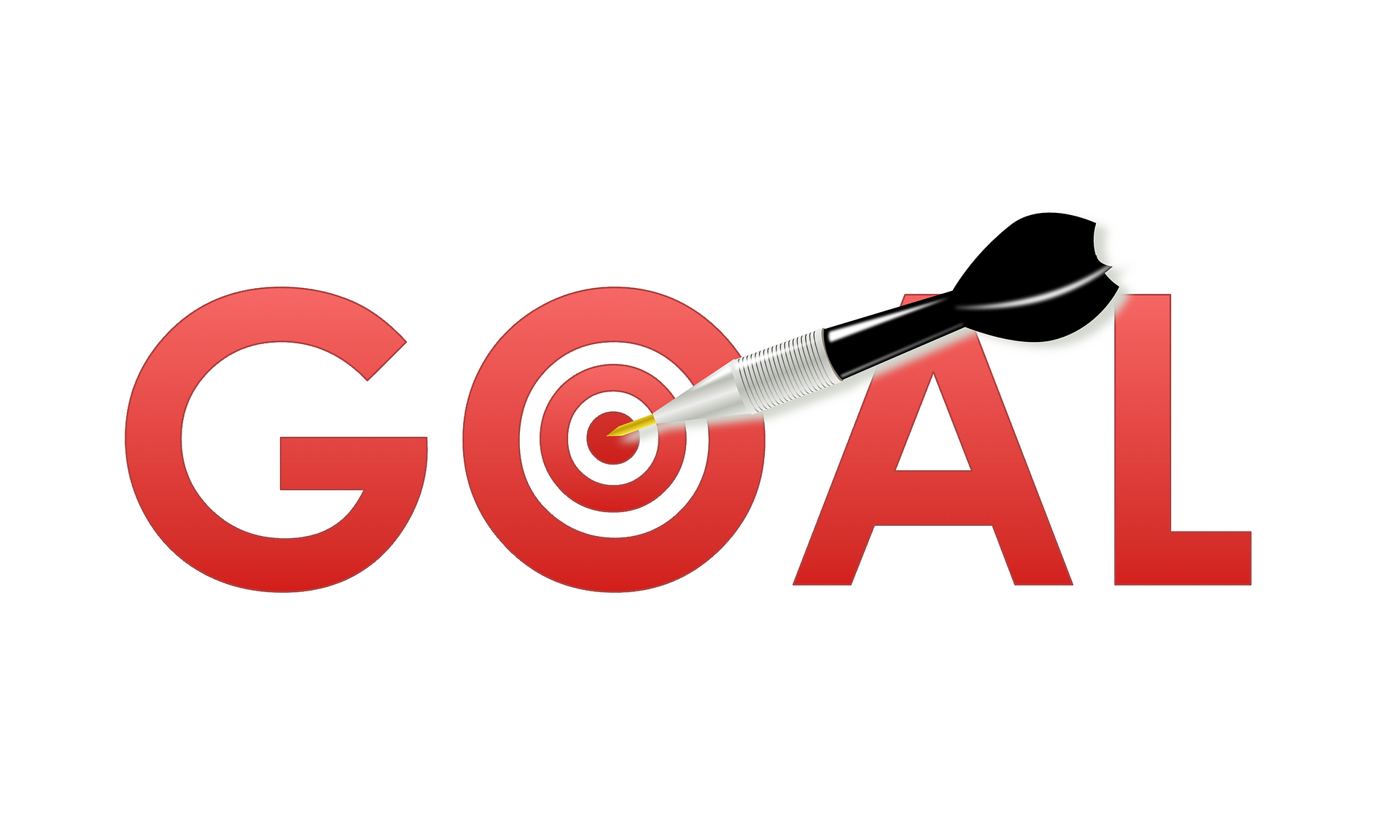Goal setting: Get on track

“If you don't make the time to work on creating the life that you want, you're going to spend a lot of time dealing with a life you don't want.” — Kevin Ngo
Last time I talked about my general opinion about productivity and how it helps us resolve two present issues. Those problems are: 1) not having the ability to manage enormous volumes of information and 2) not having any objectives to direct you. Today, I want to discuss how to deal with the latter: how to identify the goals you want to pursue and how to do so.

First of all I want to answer two questions you might ask:
What are goals exactly and why should I set goals in the first place?
The basic explanation is quite simple: A goal is an idea of a desired state in the future that is envisioned, then planned and finally commited to achieve.
The “Why” is a bit more complicated but there you go: Evidence suggests that setting goals increases your focus, motivation and performance. You then know where you want to go (and where you don’t want to go) and what to do to achieve them. To set goals and envision a positive state in the future alone releases dopamine - the reward hormone in our body - which makes you more motivated and happy. I, for example have that feeling when thinking about how many people I might have helped and what kind of connections develop with this blogseries.
Setting goals for yourself is the first step away from a passive towards a self-determined life.
The structure of this post will be as follows:
- 1️⃣ Different types of goals for different purposes
- 2️⃣ How to set goals
- 3️⃣ How to phrase goals
- 4️⃣ My personal goal-setting framework
- 5️⃣ How to make goals stick
- 6️⃣ How to find your own goals
- 7️⃣ General Tips on how to think about goals
1️⃣ Different types of goals for different purposes.
First of all we need to get on the same page of what types of goals there are. If you search for that on the internet you will find a plethora of opinions about how goals can be clustered. I personally seperate goals only by their time horizon as follows:
- Long term goals:
As the name suggests those are goals that are for the far future. I interpret this term in a timeframe from 5+ years. For example “lifetime goals” or questions like “what kind of person do I want to be?” fall in that kind of bucket. - Mid term goals:
Those are goals from 1 to 5 years. Goals like “eating healthy”, “getting sporty” fall into this bucket. - Short term goals:
These goals range from 1 week to 1 year. This timeframe is for things like “safe 5000$” or “get a new flat”.
On the internet you will find many other “goal types” like outcome based goals or SMART goals, but I dont think that those are pure goal types but a way to approach goal setting. This will be described later in this post.

2️⃣ How to set goals
So if you envision a future state of how you want to be or what you would like to achieve, how do you make it a reality?
First you need to describe the goal as good as possible to make the desired outcome clear. As mentioned previously, most people have goals but their idea is blurry. The envisioned state is not transparent enough. To successfully pursue your goal it needs to be crystal clear. Think about how exactly success would look like.
Set goals that are not that easy to achieve, aim high. Not impossible but not too easy as well. Goals should be a bit harder to set you in a state of high focus and flow state. Science suggests around 85% succes rate / 15% fail rate so you don’t get into the thinking: “failing is a bad thing”.
People almost double their chance of achieving goals when they foreshadow failure. So think about things that could fail or could hold you back and write them down.
Don’t set too many goals to retain focus on the most important things. (Experts suggest 3 big goals max). That way it is easier to see what is the most important thing to do next and you won’t fall into a decision fatigue too easy.
The last tip I have for you is the most important one:
You need to believe in your goals from the bottom of your heart. You need passion for them.
3️⃣ How to phrase goals
I would like to show you some methods that are possible for goalsetting to give you a broader range of possibilities. If you resonate with one of those you can look more into them and find out what works best for yourself. Lastly, I will describe my view regarding those methods and how I do it.
- ABC Method:
The core statement of this method is that your goals should be: Achievable, Believeable and Commit-able. There are also modifications to that Method. For instance the ABCC-Method which adds the term “Controllable” to the equation. - SMART Method:
This method is a common choice in business environments. It is an acronym for Specific, Measureable, Achievable, Reasonable and Time bound. Many people use this for their private goals as well. - CLEAR Method:
This stands for Collaborative, Limited, Emotional, Appreciable and Refinable. It gains traction often in “New work” envirmonments. - OKR Method:
More and more companies are using this method to break a vision down into little steps so that progress can be tracked and executed more easily. I know people that work on their private goals as well so try it out. You could break down your long term goals into mid and short term milestones.
I have a somewhat different perspective on goal-setting methodology in particular. Nevertheless, I wanted to show you those techniques so you can develop your own individual style. My personal oppinion is, that goals don’t have to be articulated using a specific type of ruleset. Thus a goal like “I want to life a more relaxed life” is a valid goal in my opinion as well. Most other goal setting techniques focus on making a goal measureable, which I think is not always needed. To give an example I will show you how my personal framework, which is basically a mix of different methods, looks like.

4️⃣ My personal goal-setting framework
Long term goals:
I split my long term goals into 3 different categories because they affect different aspects of my life.
- Lifegoals:
Those goals are things I want to achieve and want to look back on when I am old like “starting a familiy” or “building a house”. I reflect on those once per year and derive tasks from it if I feel the need to. - Big & Small buckets:
Those are things I want to have done some time in my life. I look at them when I seek inspiration for activities that I would like to do in the next period of time. Examples are:
Big bucket goal: see all continents. 🌎
Small bucket goal: having dinner in the dark. 🍽️ - “Which kind of person do I want to be?”
Here I describe the perks of a perfect Michael Metschl in my eyes and what my values are or should be. Those I also review on a yearly basis. E.g. “I want to be a friendly and reflected person.” or “I always want to maintain my important relationships”.
Mid term goals:
Thats my main focus for the next 5 years. For me that vision is that I earn 2k€/month 90%+ passively (not more than 4h of work a week for that money) within the next 5 years to be independend from a 9 - 5 job. I usually get more specific here by giving it a timeframe and also make it measurable. This depends on the goal I want to reach.
Short term goals:
At the start of a year I always set myself goals for the following year. I also track the progress. I do that by scoring the progress from 1 - 10 (sometimes a different number makes more sense) and regularly reviewing those goals. My yearly goals are not necessarily easy trackable but I measure the progress by how I feel how far I have come at a given time. For instance if my goal is to give earlier and better feedback when something bothers me I track how much I feel like I have improved over a period of time. After one year if I think I am still not where I want to be I take it into the next year.
You see I don’t use one exact type of goalsetting technique as described in the paragraph above for every type of goal I have. Sometimes my goals are specific and measureable, sometimes they are “freestyle”.
The important part is that goals show you where you want to go. Use them as a compass.
Now you have learned about different types of goals and their time horizon, how to set goals in general and about different goal-setting methods. I hope this helps you articulate your goals better to increase the chance of success. In the following part I will show you some tips on how to make goals stick, how you can find your own goals and my opinion on how to think about goals in general.
5️⃣ How to make goals stick
If you have your goals written down you have already taken the first step to make your goals stick. Writing something down alone gives a clearer focus and helps your mind to visualize your goals more accurately. Here are a few more tips that might help you persuing them.
- Regularly review your goals.
This is one of the most important things to do in my opinion. How you can effectively do reviews will be described in the next post of this series: “Journaling & Reviews: Stay on track” - Read them out loud every morning.
That helps you train your subconcious mind by an effect called autosuggestion. That way you always have them in mind when doing something which makes you subconsciously steer towards your goals. - Make your goals visible.
Research shows that having a visual focus on something increases the chance of achieving your goals and with less felt effort. If you want to own a boat someday, hang a picture of your dreamboat into your living room. If you want to be more relaxed hang a picture of a hammock somewhere. This also triggers autosuggestion because you see it everyday thus burning it into your subconscious mind. - Make an action plan on how to reach that goal and what the next action necessary is.
Describe this as good as you can so you always know what to do. 90% of the cases where I don’t make progress is when I don’t know exactly how or what I should do next. Thus make the friction of doing something as low as possible.
Describe the action plan so good that you don’t have to think about what to do next.
- Create milestones for your goals.
This way you constantly reward yourself for taking the next step towards your goals. Keep in mind that the reward-interval matters because it determines how much dopamine is released. A shorter amount would take away the excitment because it happens so often and a longer timeframe would take more endurance than necessary. I suggest a milestone should be reachable in about 1 week to 1 month depending on the goal timeframe itself. - Reward yourself in general.
When you feel like you have reached an important step, reward yourself with something nice. That way you condition yourself thus further increase the chance to go on. I for example smoked a hookah with my favourite tabacco when the first post of my website was published.
Keep in mind that goals are fluid. So will be your list of things you want to achieve. Take your time and don’t mind if you didn't reach them. Also you can ask yourself if you still want to reach that goal. If not, scratch it from your list.
If you want to know how to regularly review your goals and life, subscribe to my E-Mail Newsletter and follow me on social media, because that’s what I am talking about next! I will be publishing posts for the productivity series every two weeks.
Instagram | Twitter | Pinterest | Linkedin | E-Mail newsletter
I also made a goal tracker in Notion*, which helps you describe your goals better and keeps track of milestones & tasks needed for that. It´s free so try it out and set your first own goals!

6️⃣ How to find your own goals
I see many people struggle with the question: “What do I want in life?”
That’s why I tell you some tricks which help me find things I want.
- “Pay attention to what you pay attention to”
If you constantly listen to yourself and reflect what you pay attention to, you will find things that you want to achieve or improve on. Are you admiring people who seem to always be in a good mood? Maybe it's time to improve your inner mindset of happiness! Set that as a goal and think about how to achieve that. - “What would be the coolest thing that could happen in the next 5 years?”
Think about this question to envision where you want to go. It’s ok if that vision is hard to reach because it gives you a direction and that is the most important part. - “What do I want people to think of me when I die?”
Consider your funeral and the reactions of those there. What do you hope they will think about you? This hints at how you want to be perceived by others and how you want to present yourself. - “Let discomfort & fear guide the way”
The true life happens behind the edge of your comfort zone. Feeling a bit of fear or discomfort is a sign that you should make the step forward.
7️⃣ General Tips on how to think about goals
- Be honest about your goals
Don’t let social standards or fear of not achieving a specific thing make you drop a goal you thought of. Make goals for yourself, not for others. - Think about how far you have come, not how far you still have to go
Goals that are not yet reached shouldn't make you unhappy. Instead think about what you have achieved so far and be proud of that. - Nothing is carved in stone
Timeframes of goals, goalsetting methods and all of the other tips out there (and here) are not what you have to copy one by one. Those things are just general approximations which work for most people.
Don’t hesitate to find your own style that suits best for your personality and your life. Always listen to yourself! Adapt and improve your systems as you go.
“People with goals succeed because they know where they're going.” — Earl Nightingale
Next time I am going to show you how to journal & do reviews to regularly reflect on your life and keep improving day by day!
If you want to find out more about goalsetting - check out these other sources I find helpful:
- Hard Goals - The Science of extraordinary achievement*
- The Art of Improvement: “A Complete Guide to Goal Setting”
- Ali Abdaal: “I WAS WRONG - How I Set Goals”
- Thomas Frank: “How to Set Goals You’ll ACTUALLY Stick To”

Links marked with “*” are affiliate links
